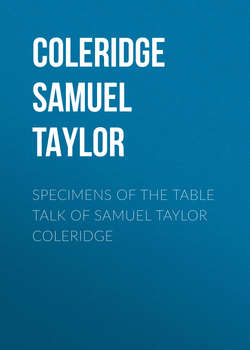Читать книгу Specimens of the Table Talk of Samuel Taylor Coleridge - Coleridge Samuel Taylor - Страница 39
TABLE TALK
May 1. 1830
ОглавлениеFALL OF MAN.—MADNESS.—BROWN AND DARWIN.—NITROUS OXIDE
A Fall of some sort or other—the creation, as it were, of the non- absolute—is the fundamental postulate of the moral history of man. Without this hypothesis, man is unintelligible; with it, every phenomenon is explicable. The mystery itself is too profound for human insight.
* * * * *
Madness is not simply a bodily disease. It is the sleep of the spirit with certain conditions of wakefulness; that is to say, lucid intervals. During this sleep, or recession of the spirit, the lower or bestial states of life rise up into action and prominence. It is an awful thing to be eternally tempted by the perverted senses. The reason may resist—it does resist—for a long time; but too often, at length, it yields for a moment, and the man is mad for ever. An act of the will is, in many instances, precedent to complete insanity. I think it was Bishop Butler who said, that he was "all his life struggling against the devilish suggestions of his senses," which would have maddened him, if he had relaxed the stern wakefulness of his reason for a single moment.
* * * * *
Brown's and Darwin's theories are both ingenious; but the first will not account for sleep, and the last will not account for death: considerable defects, you must allow.
* * * * *
It is said that every excitation is followed by a commensurate exhaustion. That is not so. The excitation caused by inhaling nitrous oxide is an exception at least; it leaves no exhaustion on the bursting of the bubble. The operation of this gas is to prevent the decarbonating of the blood; and, consequently, if taken excessively, it would produce apoplexy. The blood becomes black as ink. The voluptuous sensation attending the inhalation is produced by the compression and resistance.
